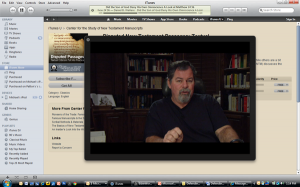 “In a free act of grace, God justifies the ungodly by faith alone apart from works, pardoning their sins, and reckoning them as righteous and acceptable in His presence. Faith is the sole instrument by which we, as sinners, are united to Christ, whose perfect righteousness and satisfaction for sins is alone the ground of our acceptance with God. This acceptance happens fully and permanently at the first instant of justification. The righteousness by which we come into right standing with God is not anything worked in us by God, neither imparted to us at baptism nor over time, but rather is accomplished for us, outside ourselves, and is imputed to us.” Bethlehem Baptist Church, Statement of Faith
“In a free act of grace, God justifies the ungodly by faith alone apart from works, pardoning their sins, and reckoning them as righteous and acceptable in His presence. Faith is the sole instrument by which we, as sinners, are united to Christ, whose perfect righteousness and satisfaction for sins is alone the ground of our acceptance with God. This acceptance happens fully and permanently at the first instant of justification. The righteousness by which we come into right standing with God is not anything worked in us by God, neither imparted to us at baptism nor over time, but rather is accomplished for us, outside ourselves, and is imputed to us.” Bethlehem Baptist Church, Statement of Faith
This message below (broken up into 5 parts) by Dr. R. C. Sproul is something I wish every Christian could hear. Then I would wish that they heard it again. Even if we think we know this subject inside out, it would still do our souls good to hear this doctrine taught again. Yet in listening to this lecture by Dr. Sproul, I believe we all may well learn a thing or two.
As R.C. says, the doctrine of justification by faith alone is not hard to comprehend, but to get it into our bloodstream requires that it be heard repeatedly. For my own heart’s sake, if I was on my deathbed with only hours to live, and could hear only one sermon before leaving this world, I would want to hear about Sola Fide “justification by faith alone” one more time. It is the very heart of the Christian gospel.
Some Quotes from Martin Luther:
“Justification by faith alone is the article of the standing or falling Church.”
“This doctrine [justification by faith alone] is the head and the cornerstone. It alone begets, nourishes, builds, preserves, and defends the church of God; and without it the church of God cannot exist for one hour. For no one who does not hold this article or, to use Paul’s expression, this ‘sound doctrine’ (Titus 2:1) is able to teach aright in the church or successfully to resist any adversary… this is the heel of the Seed that opposes the old serpent and crushes its head. That is why Satan, in turn, cannot but persecute it.”
“Whoever departs from the article of justification does not know God and is an idolater… For when this article has been taken away, nothing remains but error, hypocrisy, godlessness, and idolatry, although it may seem to be the height of truth, worship of God, holiness, etc… If the article of justification is lost, all Christian doctrine is lost at the same time.”
“When the article of justification has fallen, everything has fallen. Therefore it is necessary constantly to inculcate and impress it, as Moses says of his Law (Deut. 6:7); for it cannot be inculcated and urged enough or too much. Indeed, even though we learn it well and hold to it, yet there is no one who apprehends it perfectly or believes it with a full affection and heart. So very trickish is our flesh, fighting as it does against the obedience of the spirit.”

Here then is Dr. Sproul: Continue reading

 “It is a good thing for an uneducated man to read books of quotations.” – Winston Churchill
“It is a good thing for an uneducated man to read books of quotations.” – Winston Churchill FIVE ITEMS:
FIVE ITEMS: (3) If you are interested in learning something about the field of textual criticism but don’t know where to start, this will be right up your street. The Center for the Study of New Testament Manuscripts (CSNTM) is committed to helping others understand the reliability of our New Testaments, the history of translations, the study of the text, and significant figures who have made this possible. Beginning today, CSNTM is making a series of videos concerning New Testament manuscripts, textual criticism, history of the New Testament, and expert commentary on key verses available as a free download on iTunes U. Featured in the videos are interviews and footage shot around the world of important people involved in the work of the Center. Noted scholar, Dr. Daniel B. Wallace explains important aspects in the study of the text of the New Testament – found
(3) If you are interested in learning something about the field of textual criticism but don’t know where to start, this will be right up your street. The Center for the Study of New Testament Manuscripts (CSNTM) is committed to helping others understand the reliability of our New Testaments, the history of translations, the study of the text, and significant figures who have made this possible. Beginning today, CSNTM is making a series of videos concerning New Testament manuscripts, textual criticism, history of the New Testament, and expert commentary on key verses available as a free download on iTunes U. Featured in the videos are interviews and footage shot around the world of important people involved in the work of the Center. Noted scholar, Dr. Daniel B. Wallace explains important aspects in the study of the text of the New Testament – found 
 From virginiahuguenot.blogspot.com
From virginiahuguenot.blogspot.com From John’s Gospel, we can make the following scriptural statements:
From John’s Gospel, we can make the following scriptural statements: Jim, with his 15 year old daughter Alisa
Jim, with his 15 year old daughter Alisa